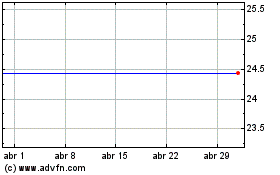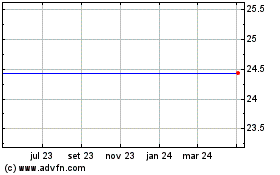Discovery Faces Harsh Reality With WarnerMedia -- Heard on the Street
25 Maio 2021 - 8:23AM
Dow Jones News
By Dan Gallagher
Even show-business marriages have longer honeymoon periods than
this.
Last Monday's announcement of a mega-media combination of
Discovery Inc. with the WarnerMedia business of AT&T initially
thrilled the investors of both companies. Discovery's share price
opened the day up 10% on the prospect of the niche cable-content
provider suddenly becoming one of the largest Hollywood players.
Meanwhile, AT&T's share price jumped nearly 4% on the notion
that the telecommunications giant could focus better on its core
business without having to also pour capital into a media venture
that was never popular with its own investors anyway.
The warm feelings didn't last. Both stocks soon turned south and
closed in the red that day. And Discovery kept falling -- losing
nearly 12% by the end of the week. The potential merits of the deal
haven't changed, but the risks have grown clearer. The complicated
transaction will result in a much bigger and much more indebted
Discovery, run by its current management but majority owned by
AT&T shareholders. And the combined company faces a rapidly
changing media landscape with a growing list of competitors. For
example, last week brought several reports that Amazon.com was in
takeover discussions with MGM Holdings. The Wall Street Journal
reported Monday that the deal could be announced this week.
Discovery's stock had already been on a wild ride due to its
part in the Archegos Capital selloff earlier this year. The pending
merger will add some fresh drama. Both Discovery and AT&T have
to preserve the value of the WarnerMedia business during a highly
uncertain period while awaiting regulatory approvals, which could
take a year or more. The New York Times reported that WarnerMedia
Chief Executive Officer Jason Kilar already has hired a legal team
to negotiate his departure. Doug Creutz of Cowen noted in a report
last week that Twentieth Century Fox saw "pretty serious
degradation in performance" while Disney was working to complete
its acquisition of the studio in 2019. "We're not sure that the
announcement of $3B in synergies will be well-received by
WarnerMedia employees, either, particularly having just survived a
synergy-driven purge associated with the AT&T acquisition," he
wrote.
How to integrate the two operations is also a major question
hanging over the deal. As the home for the old Warner Bros. studio
along with HBO and the Turner media properties, WarnerMedia
specializes in broad offerings designed for mass appeal. Discovery
has made its name with more niche offerings such as Animal Planet,
TLC and the recently acquired Food Network and HGTV. An investor
poll by Bernstein Research found a large split on whether the
company should combine the HBO Max and Discovery+ services into one
offering. Investors in the poll were also the "least confident" in
the combined company's ability to achieve the stated goal of $15
billion in direct-to-consumer revenue by 2023.
In a note to clients Monday, MoffettNathanson analysts wrote
that Discovery has "a nice call option on transforming HBO Max into
a global juggernaut that trades at a deep discount to Netflix and
Disney." But the firm still downgraded the stock to a "neutral"
rating, noting that the reward was "outweighed by near-term risks
ahead of the deal closing."
Discovery's most hair-raising reality show might be the one the
company has now cast itself in.
Write to Dan Gallagher at dan.gallagher@wsj.com
(END) Dow Jones Newswires
May 25, 2021 07:14 ET (11:14 GMT)
Copyright (c) 2021 Dow Jones & Company, Inc.
Discovery (NASDAQ:DISCA)
Gráfico Histórico do Ativo
De Mar 2024 até Abr 2024

Discovery (NASDAQ:DISCA)
Gráfico Histórico do Ativo
De Abr 2023 até Abr 2024
